Protein is a crucial nutrient that plays many important roles in your body.
From building muscle to supporting your immune system, getting enough protein is essential for overall health.
But with so much information out there, it’s easy to get confused about how much protein you really need and the best ways to get it.
Many common beliefs about protein intake are actually myths that can lead you astray in your nutrition goals. By understanding the facts behind these misconceptions, you can make better choices about your diet and ensure you’re getting the right amount of protein for your individual needs.
Let’s take a look at 8 common protein myths and uncover the truth behind them.
1) Protein Causes Kidney Damage
You’ve probably heard that eating too much protein can harm your kidneys.
This myth has been around for years, but recent research suggests it’s not accurate for most people.
A study found that high-protein diets don’t negatively affect kidney function in healthy individuals.
Researchers looked at people consuming various levels of protein, including up to 1.5 grams per kilogram of body weight daily.
For those without pre-existing kidney issues, there’s no evidence that increased protein intake causes damage.
Your kidneys are designed to process protein, and they’re quite good at it.
However, if you have chronic kidney disease or other kidney problems, you should talk to your doctor about your protein intake.
In these cases, a high-protein diet might not be suitable.
2) High Protein Diets Are Bad for Bones
You might have heard that eating lots of protein can weaken your bones, but this is actually a myth.
Research shows that a high-protein diet doesn’t harm bone health at all.
In fact, protein can be good for your bones.
The International Osteoporosis Foundation states that a balanced diet with enough protein benefits bone health.
This is true whether you get your protein from animal or plant sources.
Protein helps build and maintain strong bones.
It’s an essential nutrient for bone formation and repair.
Eating enough protein can even help reduce the risk of fractures as you age.
What’s important is to pair your protein intake with other bone-friendly nutrients.
Make sure you’re getting enough calcium and vitamin D along with your protein.
These work together to keep your bones strong and healthy.
3) You Can’t Get Too Much Protein
You’ve probably heard that you can never eat too much protein.
This is a common misconception.
While protein is essential for your body, consuming excessive amounts can have drawbacks.
Your body can only use a certain amount of protein at a time.
Excess protein doesn’t magically turn into muscle.
Instead, it’s often stored as fat or eliminated through your kidneys.
Eating too much protein can put extra strain on your kidneys.
This is especially concerning if you have existing kidney issues.
It’s important to balance your protein intake with other nutrients.
High-protein diets might lead to dehydration.
Protein metabolism requires more water, so you’ll need to increase your fluid intake accordingly.
Excessive protein consumption can also cause digestive discomfort like bloating or constipation.
This is particularly true if you’re getting most of your protein from animal sources.
4) Plant Protein Isn’t Complete
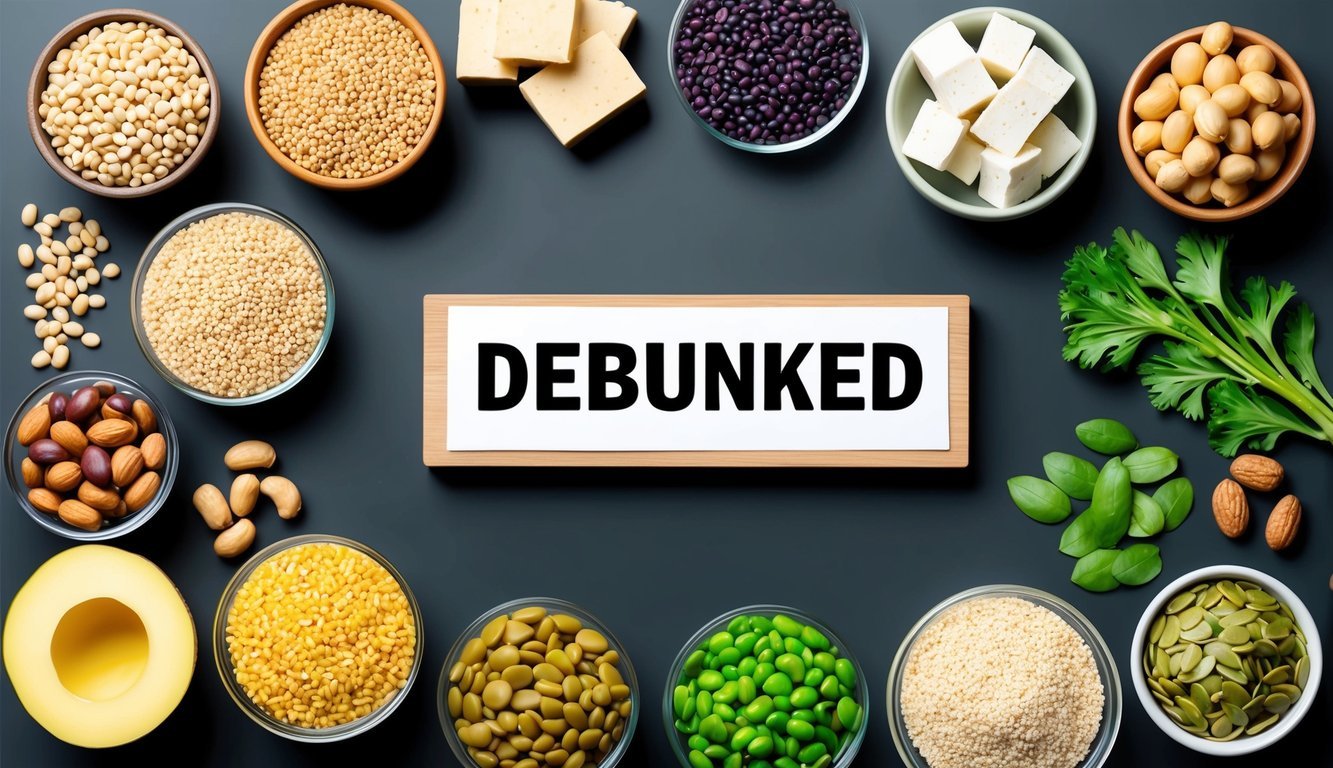
You’ve probably heard that plant proteins are incomplete and lack essential amino acids.
This myth has been circulating for decades, but it’s time to put it to rest.
The truth is, all plant proteins contain all nine essential amino acids.
They simply have them in varying amounts.
Your body doesn’t need to get all amino acids from a single meal or even a single day.
As long as you eat a variety of plant-based foods throughout the week, you’ll easily meet your protein needs.
Beans, lentils, nuts, seeds, and whole grains are excellent sources of plant protein.
Don’t stress about combining specific foods at each meal.
Your body is smart and can store amino acids for later use.
Just focus on eating a diverse range of plant foods.
Many athletes and bodybuilders thrive on plant-based diets, proving that plant proteins can support muscle growth and athletic performance.
So go ahead and enjoy your plant-based meals without worrying about incomplete proteins.
5) Animal Protein Is Always Better
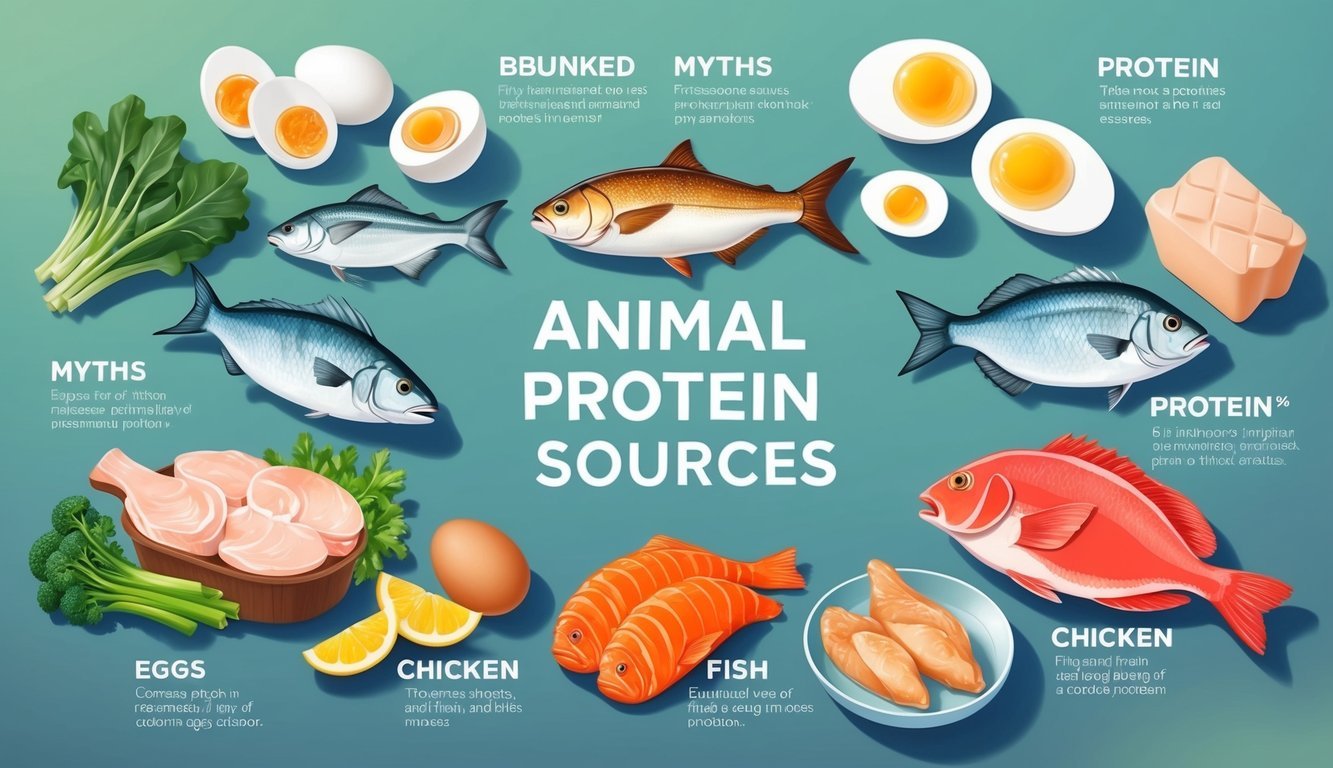
You might have heard that animal protein is superior to plant-based sources.
This common belief isn’t entirely accurate.
While animal proteins are complete, containing all essential amino acids, plant proteins can be just as effective when combined properly.
Animal proteins from meat, fish, eggs, and dairy are easily digestible and provide a full amino acid profile.
They’re often considered the gold standard for protein intake.
But don’t count out plant proteins just yet.
Beans, lentils, nuts, and grains can offer excellent protein when eaten in combination.
By mixing different plant sources, you can get all the amino acids your body needs.
Plant proteins also come with added benefits.
They’re often lower in saturated fat and higher in fiber than animal sources.
Plus, they’re packed with vitamins, minerals, and antioxidants.
6) Protein Supplements Are Needed
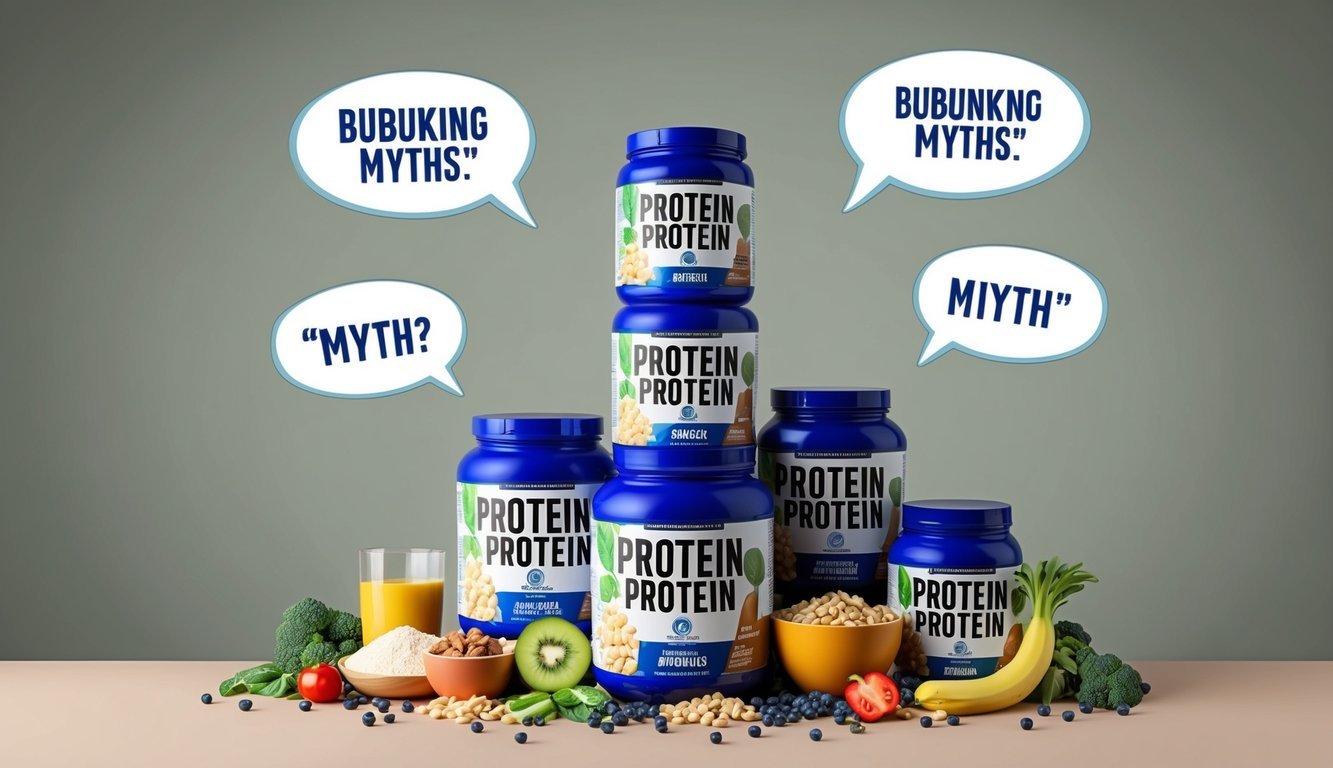
Many people believe protein supplements are essential for building muscle or meeting daily protein needs.
This isn’t true for most individuals.
A balanced diet with varied protein sources typically provides enough protein for the average person.
Whole foods like lean meats, fish, eggs, dairy, legumes, and nuts can easily meet your protein requirements.
Supplements may be helpful in certain situations.
If you’re an athlete, bodybuilder, or have increased protein needs, they can be a convenient option.
Vegetarians and vegans might also benefit from supplements to ensure adequate intake.
However, for most people, protein supplements aren’t necessary.
They’re often more expensive than whole food sources and may contain added sugars or artificial ingredients.
Instead of relying on supplements, focus on incorporating protein-rich foods into your meals.
This approach not only provides protein but also offers additional nutrients and fiber that supplements lack.
7) Older Adults Don’t Need Extra Protein

Contrary to popular belief, older adults actually require more protein than their younger counterparts.
As you age, your body becomes less efficient at processing protein, making it crucial to increase your intake.
Research suggests that adults over 65 may need up to 1.2 grams of protein per kilogram of body weight daily.
This is higher than the recommended 0.8 grams for younger adults.
Increased protein consumption helps maintain muscle mass, which naturally declines with age.
It also supports bone health and can reduce the risk of falls and fractures.
Snacking on protein-rich foods can be an effective way to meet these higher needs.
Choose nutrient-dense options like nuts, Greek yogurt, or hard-boiled eggs.
If you’re an older adult, consider spreading your protein intake throughout the day.
This approach can help your body utilize protein more effectively for muscle maintenance and repair.
8) All Protein Powders Are the Same
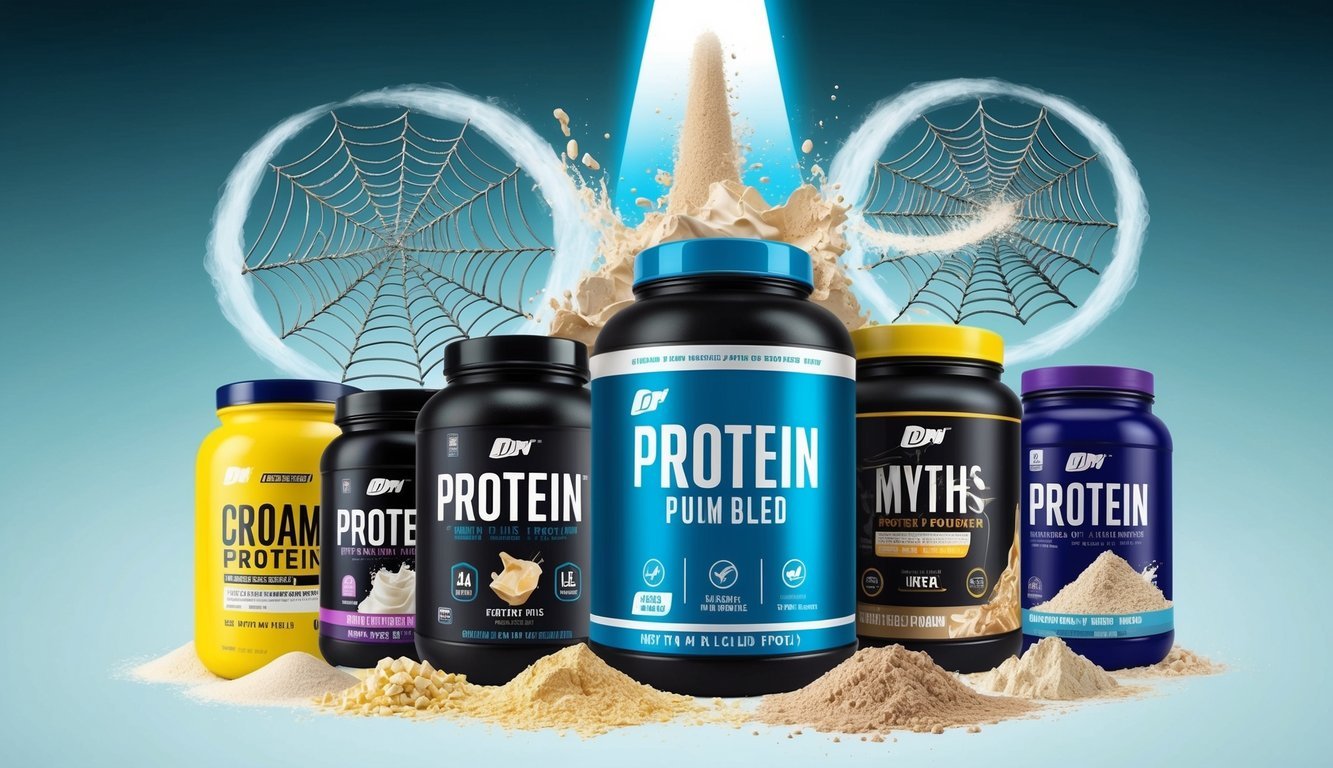
You might think protein powders are interchangeable, but that’s far from true.
Each type offers unique benefits and drawbacks.
Whey protein is popular for its quick absorption and complete amino acid profile.
It’s great for post-workout recovery, but may not suit those with dairy sensitivities.
Casein, another milk-based protein, releases slowly.
This makes it ideal for nighttime use or when you need sustained protein release.
Plant-based options like pea, rice, or hemp protein are excellent for vegans or those with dairy allergies.
They often have varied amino acid profiles and may require combining for completeness.
Protein concentrates are less processed and contain more nutrients, but also more fats and carbs.
Isolates are purer protein with fewer additional compounds.
Some powders include added vitamins, minerals, or digestive enzymes.
Others may contain artificial sweeteners or fillers.
Your choice should depend on your dietary needs, fitness goals, and personal preferences.
It’s worth exploring different types to find what works best for you.
Understanding Protein Basics
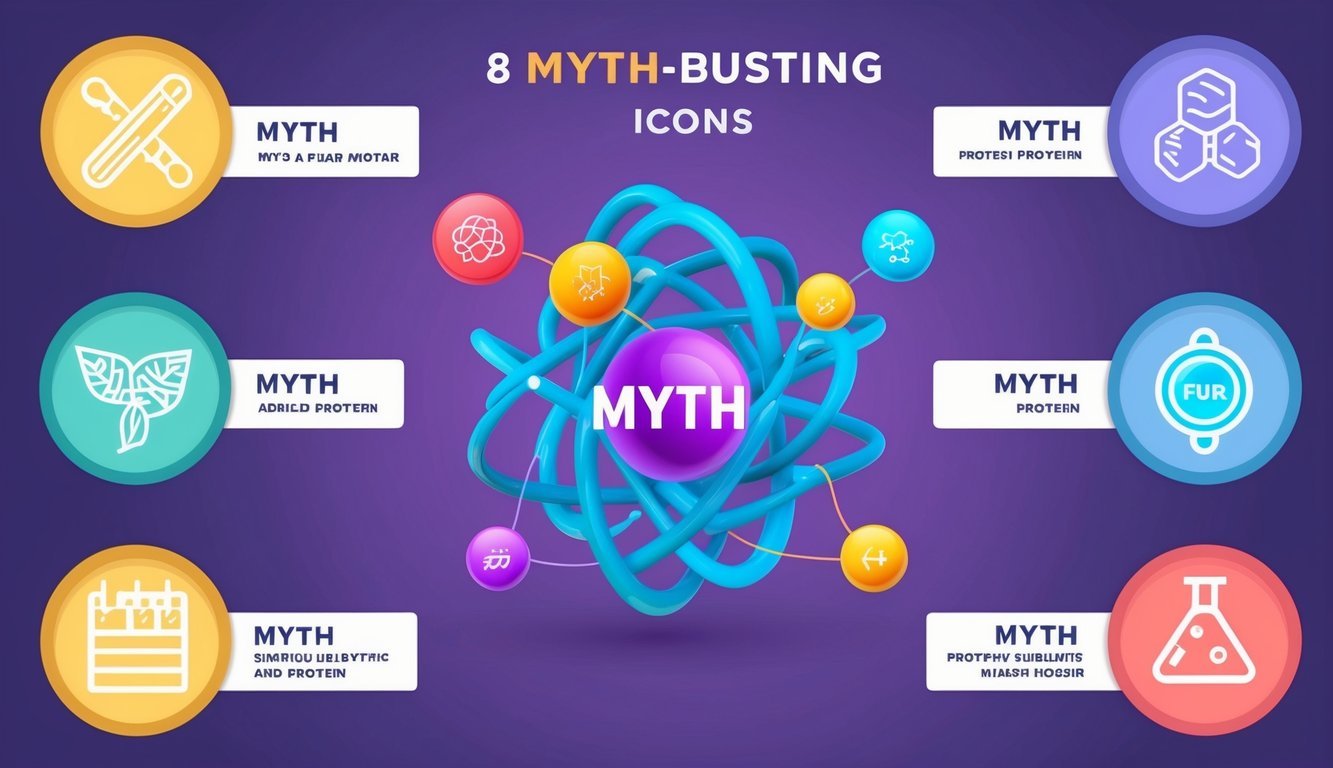
Protein is a crucial macronutrient that plays many vital roles in your body.
It’s essential for building and repairing tissues, producing enzymes and hormones, and supporting immune function.
The Role of Protein in Your Diet
Protein is made up of amino acids, often called the building blocks of life.
Your body uses these amino acids to create new proteins, repair damaged tissues, and support various bodily functions.
Protein helps:
- Build and maintain muscle mass
- Support bone health
- Boost metabolism
- Promote satiety and weight management
- Enhance immune function
You’ll find protein in both animal and plant sources.
Animal proteins like meat, fish, eggs, and dairy are complete proteins, containing all essential amino acids.
Plant proteins like beans, lentils, nuts, and some grains can be combined to provide all essential amino acids.
Daily Protein Requirements
Your protein needs depend on factors like age, sex, weight, and activity level.
The general recommendation is:
- 0.8 grams per kilogram of body weight for sedentary adults
- 1.2-2.0 grams per kilogram for active individuals or athletes
For a 70 kg (154 lb) person, this translates to:
- 56 grams daily for sedentary adults
- 84-140 grams daily for active individuals
It’s best to spread your protein intake throughout the day rather than consuming it all at once.
Aim for 20-30 grams of protein per meal, with some protein in snacks too.
Remember, more isn’t always better.
Excessive protein intake doesn’t provide extra benefits and may strain your kidneys if you have existing health issues.
Differentiating Protein Sources
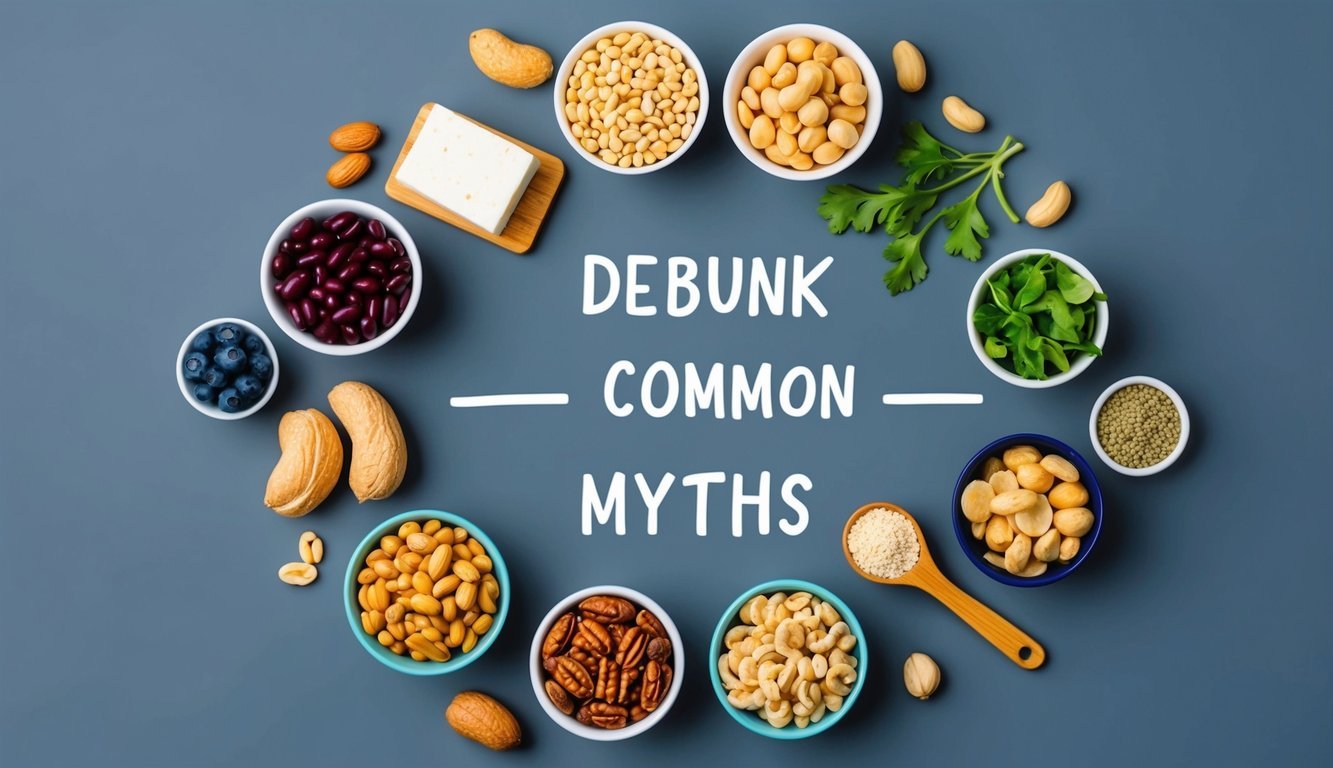
Protein sources vary in their nutritional profiles and benefits.
Understanding these differences can help you make informed choices about which proteins to include in your diet.
Animal-Based vs Plant-Based Proteins
Animal-based proteins typically provide all essential amino acids in one package.
They’re often considered “complete” proteins.
Sources include meat, fish, eggs, and dairy products.
These tend to be more easily absorbed by your body.
Plant-based proteins can be excellent alternatives, especially for vegetarians and vegans.
Beans, lentils, nuts, and seeds are rich in protein.
While some plant sources lack certain amino acids, combining different plant proteins can create complete protein profiles.
Consider incorporating both types into your diet for variety and balanced nutrition.
Mix it up with a bean burrito for lunch and grilled chicken for dinner.
Complete and Incomplete Proteins
Complete proteins contain all nine essential amino acids your body can’t produce on its own.
Most animal proteins are complete.
Quinoa and soy are rare plant-based complete proteins.
Incomplete proteins lack one or more essential amino acids.
Many plant sources fall into this category.
Don’t worry – you can easily combine incomplete proteins to form complete ones.
Try rice and beans or hummus with whole grain pita.
Aim for a mix of protein sources throughout the day.
This ensures you’re getting all necessary amino acids.

